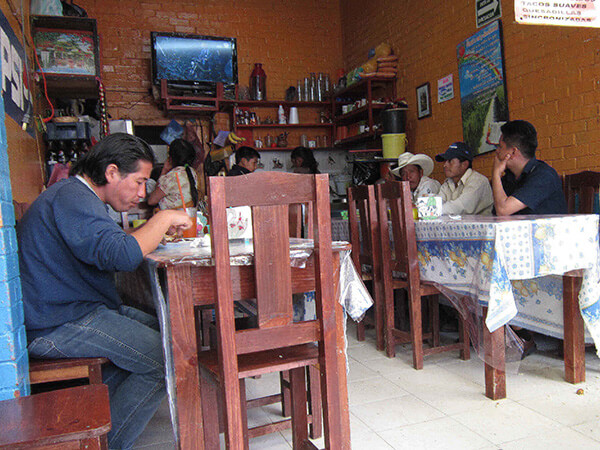How to Cross the Language Barrier in Mexico
Spanish Language, Mexican Culture and Stories of Immersion Learning
By Ted Campbell
12/22/2015
 > |
A stop sign in Mexico. Now that is an easy word to pick up. |
I joke that when I first moved to Mexico four years ago, I only knew three words of Spanish: cerveza, bonita, and gracias (beer, beautiful, thank you). All those boring years of high school and university Spanish were wasted.
But the truth is I’d already done some traveling in Latin America and was quite confident when ordering food, getting a hotel, or engaging in some light chitchat on the bus. But, thanks to fast talkers and lots of slang, navigating the Spanish language in Mexico — especially Mexico City — is a different story.
Imagine a party where everyone speaks gibberish. The music is loud enough that you lean in close to hear what people say. When the words come through, you can hear but don’t understand. It’s gibberish.
You experience a strange mixture of confusion, boredom, and frustration. And what makes it worse is that people keep coming over because you speak just enough gibberish to encourage them to talk more.
And it goes on until 5 a.m. And when you wake up it starts all over again.
I had this experience countless times during years of parties and weekend trips with friends before I became reasonably fluent in Spanish. Once, on a 5-day trip in Puerto Vallarta, after days of barely understanding nonstop conversation, I sat next to my buddy on the beach, pulled out my notebook, and managed to get him to explain to me some of the words I kept hearing.
I jotted down about 20 words. From then on those words jumped out at me until I had no doubt about what they meant. Just a little help, a little motivation, makes a huge difference.
Language Breakthroughs and the Role of Misunderstanding
Today, four years later, I have another small victory. I don't realize until hanging up. I had understood the phone company’s voice recording in super fast, highly formal Spanish.
“Your phone is out of credit. Please get a recharge at one of our authorized centers.”
I turn off the cheap cell phone and put it in my pocket. I feel good, proud. It’s going to be a nice day.
My Spanish isn’t perfect, but I get my point across. I speak Spanish all day. The days are long gone when a party drove me mad while I tried in vain to understand conversations that I encouraged by knowing just enough Spanish.
People aren’t very good when told they aren’t being understood. This goes for Spanish, English, probably all languages. How many times have you heard someone speak without syntax to a foreigner, as if it helps? “You go now? Hungry now?”
Or some just repeat themselves, louder and louder each time. A common complaint about Americans is that we only speak English, but then we expect everyone else to speak English when they come to our country. And when they don’t understand, we say it LOUDER.
It’s the same all over the world. Plenty of times when I tell a friend that I didn’t understand something, he repeats it, louder each time, as if the meaning would suddenly pop out at me, clear as day.
Until today I ignored phone messages altogether. I never knew nor cared what they were about, whether the other person’s phone didn’t work, my phone didn’t work, I had run out of credit, or whatever.
But this morning I understood everything. The excuses are gone. So repetition does help. Interesting.
I need to make a call, so I leave my apartment and walk two blocks through downtown Toluca in central Mexico to a drugstore, Farmacias del Ahorro (Pharmacies of Savings). I ask for a recarga (recharge): a jolt of money into my account so I can use the phone again. 200 pesos (around US$16) goes a long way, a month at least.
I tell the smiling female clerk my phone number as clearly as possible. I lean over the counter to peek at the computer screen, making sure she gets it right. She does — not one number off. Often my 35 is heard as 85, though anyone who speaks Spanish knows that treinta and ochenta sound nothing alike, at least not when spoken properly.
I wonder what would happen if I didn’t catch a mistake and put money on the wrong number. Does the lucky soul get a nice credit on her phone? Would she even notice?
Or would the money disappear into the vast accounts of Telcel, the biggest cell phone service in Mexico, becoming just a drop in the ocean of pesos that eventually finds its way to Carlos Slim, most years the richest man in the world?
Another joke I make with friends here in as I teach in Mexico is that I spend my life trying to be understood. “At work, I speak English and nobody understands me. In everyday life, I speak Spanish and nobody understands me.”
Misunderstanding is a way of life. But, in fairness, I teach at a university, and I have class-loads of high-level students who have no problem understanding me. And I have plenty of friends who gladly tolerate my gringo Spanish.
But I teach lots of beginners, trying to make them understand English without resorting to Spanish, and I often meet Mexicans who are unaccustomed to hearing foreigners speak Spanish. Sometimes what the waitress brings is quite different from what I ordered.
I learned Spanish on many fronts: grammar books, podcasts, lots of song lyrics, and a few short courses, including CBA Spanish School, an excellent school in Guatemala. But most of all I hit the streets and spoke.
|
There are many ways to learn Spanish besides memorization in alpha order, of course. |
Language, Culture, and Mistakes
Language cannot be separated from culture. When you learn a language and live in the country where it’s spoken, you can put certain things in context, especially when you are a teacher and you are trying to correct someone’s mistake.
For example, Mexicans sometimes have trouble translating lunch. Comida, their word for the second meal of the day, also translates as food. Besides, they eat lunch later in the afternoon, between 2-4 p.m. If lunch is at 4, isn’t it dinner?
 |
| A full Mexican comida (meal) can be ordered at a fondita (restaurant) in the middle of the day, and it is usually a set menu.
Photo by Ted Campbell. |
Cultural differences run a lot deeper than mealtimes. In Distant Neighbors, Alan Riding argues that no two countries in the world have a longer border and less understanding. The cultural differences between Mexico and the U.S. are huge — maybe not as great as China and Russia, who share a longer border, but the folks who live on the Chinese/Russian border probably have more in common with each other than with the people in their capitals.
I tell my students all the time that really understanding a language is a lot more than translating it in your mind. As S.I. Hayakawa writes in Language in Thought and Action, the word is not the thing. The word merely represents the thing. So translating from word to word is meaningless. The process should be: word — thing — word.
Everyone has their own learning style: in a classroom or at home with books, music and podcasts. But we all must embrace misunderstanding. You have to make tons of mistakes before you can understand the basics of a language.
You must use mistakes to your advantage. At least don’t let them slow you down. As Bruce Lee says, we must be like water. We must flow with it.
Misunderstanding as a way of life.
 |
Ted Campbell is a freelance writer, Spanish-English translator, and university teacher living in Mexico.
He has written two guidebooks (ebooks) about Mexico, one for Cancun and the Mayan Riviera and another for San Cristobal de las Casas and Palenque in Chiapas, both also available at Amazon.com or on his website.
For stories of adventure, culture, music, food, and mountain biking, check out his blog No Hay Bronca.
To read his many articles written for TransitionsAbroad.com, see Ted Campbell's bio page.
|
|
